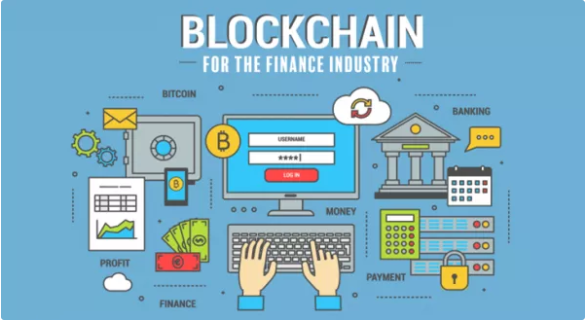The evolution of blockchain technology has caused a seismic shift in the financial services industry. Initially conceptualized as the underlying technology for Bitcoin, blockchain has transcended its cryptocurrency origins to revolutionize the very foundations of financial transactions, security, and operational efficiency. Its disruptive potential has spurred the financial sector to embrace this innovation, leading to transformative changes across various domains.
About Blockchain in financial services
Blockchain in financial services refers to the application within the financial industry to enhance various aspects of transactions, security, and operational efficiency. At its core, this service is a decentralized, distributed ledger system that allows the recording of transactions across a network of computers in a secure, transparent, and immutable manner.
In financial services, blockchain technology offers several key advantages:
- Transparency and Immutability: Transactions recorded on a blockchain are transparent and immutable. Once a transaction is added to the chain, it cannot be altered or deleted, ensuring an accurate and trustworthy record of financial activities.
- Enhanced Security: The cryptographic nature of blockchain ensures high-level security. Each block in the chain is cryptographically linked to the previous one, creating a secure and tamper-proof system. This reduces the risk of fraud and unauthorized alterations.
- Efficiency and Speed: It can streamline and expedite financial processes. Transactions that traditionally took days can occur almost instantly with this technology, reducing settlement times and operational costs.
- Cost Reduction: By eliminating intermediaries and automating processes through smart contracts, can significantly reduce transaction costs associated with traditional financial systems.
- Improved Compliance: It facilitates robust compliance mechanisms, especially in areas like anti-money laundering (AML) and Know Your Customer (KYC) protocols. The transparent and traceable nature of blockchain records aids in regulatory compliance.
- Innovation in Asset Management: Asset tokenization on a blockchain allows for the representation of real-world assets as digital tokens, unlocking opportunities for fractional ownership, increased liquidity, and more efficient trading in traditionally illiquid markets.

Financial institutions are leveraging blockchain technology across various applications within the industry, including:
- Payment and Settlement Systems: It is used to facilitate faster and more secure cross-border payments and settlements, reducing the need for intermediaries and improving efficiency.
- Smart Contracts: Self-executing contracts written on the blockchain automate and enforce contractual agreements, reducing reliance on intermediaries and streamlining processes.
- Cryptocurrencies and Digital Assets: This technology underpins cryptocurrencies like Bitcoin and Ethereum. Financial institutions are exploring digital assets as a new asset class, offering custody and trading services to clients.
- Trade Finance: It is being used to digitize trade finance processes, enhancing transparency and reducing paperwork and delays in trade transactions.
It is a decentralized, distributed ledger system that enables the secure recording of transactions across multiple computers. Its cryptographic and consensus-based framework ensures transparency, immutability, and tamper resistance, eliminating the need for intermediaries in verifying and executing transactions. This fundamental aspect of blockchain technology aligns with the financial industry’s quest for enhanced security, transparency, and efficiency.

One of the most profound impacts on the financial services sector lies in its potential to streamline and revolutionize the cumbersome processes associated with traditional banking. Settlements that once took days can now occur almost instantaneously through blockchain-based systems, reducing operational costs and risks associated with delayed transactions.
Click here to check out Credit Calculators.
Moreover, its records minimize the risk of fraud and enhance transparency, a critical element in financial services. Institutions are leveraging blockchain to fortify anti-money laundering (AML) and Know Your Customer (KYC) protocols, creating robust systems for identity verification and compliance.
The rise of cryptocurrencies, while initially met with skepticism, has compelled financial institutions to explore digital assets’ potential. Major banks and investment firms have begun offering custody and trading services for cryptocurrencies, acknowledging their growing significance as a legitimate asset class.

Despite these advancements, challenges persist. Scalability, regulatory concerns, interoperability, and the integration of legacy systems with this technology are among the hurdles that the industry continues to navigate.
Regulatory clarity remains a critical factor in the widespread adoption of this system in finance. Governments and regulatory bodies are in the process of formulating frameworks to ensure compliance while fostering innovation, striking a delicate balance between oversight and technological advancement.
In conclusion, the financial services industry’s embrace of blockchain marks a pivotal moment in its evolution. It holds immense promise for the financial services industry, challenges such as scalability, regulatory compliance, interoperability, and integration with existing systems need to be addressed for widespread adoption and seamless integration into the financial ecosystem. The transformative potential of this technology promises increased efficiency, transparency, and security while challenging traditional norms. As the industry continues to explore and integrate blockchain solutions, collaboration between stakeholders, technological innovation, and regulatory alignment will be key to realizing the full spectrum of benefits that blockchain offers to the financial world.
or more info about Credit Card Payments, visit here: credit calculator








2 Responses
I really liked your site.
I really liked your site.